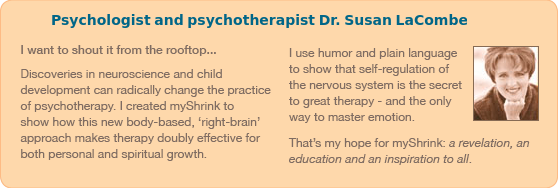If you find it hard to say "no" to friends, you're a people pleaser - even to strangers - and your husband treats you like a doormat, then you'll benefit from strengthening your personal boundaries.
"Whatever you are willing to put up with is exactly what you will have." (anon.)
Problems with setting and maintaining boundaries are common issues dealt with in counseling. Those people who have good boundary management tend to do very well in our society.
Yet, most people could improve on their boundary maintenance.
What are boundaries?
Boundaries reflect more than our need for physical space. They include any aspect of our interactions with others, including our relationship with ourselves (i.e. avoiding self-sabotaging activities) and our environment (e.g. protecting ourselves from noise and noxious stimuli).
Boundaries reflect our core values, our respect for ourselves and our need for safety and protection. They include being able to say no and mean it, or saying yes and meaning it. They are a way we define ourself separately from another.
They include the contracts we have with others: authority figures (our boss, the plumber who agrees to a job), financial (saying no to a purchase), sexual (saying yes when the time is right), professional (agreements we have with others about our work) among many others.
We even have boundaries with our environment. In my practice people will sit on the couch in ways that reflect their boundaries. They might feel sunk into the couch, posed against it, away from the sides or relaxed into it and using the sides for support. These are all characteristic ways we respond depending on our sense of boundaries within our own body.
Boundaries in Relationships
Strong personal boundaries in relationships are reflected inmany ways and especially when we can easily set limits to protect ourselves.
"Yes, I do care for you. And, I also have a need to be out of the house to see my friends at least one night a week."
In other words we can become close to another but also recognize when it is necessary to maintain some distance.
Individuals with poor boundaries tend to compromise their sense of self in relationships.
"If you would feel lonely, I won't go."
Some people with poor boundaries draw on their partners' identities to support their self-worth.
"You're right, it is a good idea for me to have an interest outside the house. But I should check with my husband first."
How do we develop poor boundaries?
Being raised in a family with poor boundaries (i.e. in a physically, emotionally or sexually abusive home) is one obvious source.
Some families are enmeshed causing few boundaries to exist between family members. Unless there is a consensus, going outside the range of typical behaviours is frowned upon. To do something different, is experienced by others in the family as if you are betraying the family.
We can also develop poor boundaries with physical traumas. Surgeries, painful dental procedures and falls are a few examples.
Few people are aware that the womb environment can also create boundary problems. Consider for a moment the fetus who struggles with having a different blood type than the mother.
How to change your boundaries
Poor boundaries are sometimes a function of ignorance. That is, you haven't been exposed to good role models so it's understandably hard for you to call up from within yourself what is appropriate and what isn't.
But it would be very difficult to consider all possible scenarios that you might come across in your life and to depend on seeking the advice of others. Even then, knowing what's appropriate doesn't necessarily mean you would have the capacity to set your boundary.
One of the first steps in changing your boundaries is to learn to feel them. Any time we set a boundary or don't set a boundary, we feel it in our body in the form of an arousal pattern. That is, the nervous system is going to relax or go into a sympathetic response (i.e. stress, anxiety).
Consider the following sympathetic nervous system responses:
- clenched teeth
- racing heart
- dry mouth
- shoulders tense
- physically withdrawn
- shallow breath
- feeling weak
- hands clammy
- perspiring

- feeling shaky
- stuttered speech
- foggy brain
- racing thoughts
- weak posture
- rounded shoulders
Sometimes we'll go into a freeze response:
- Blank look
- holding breath in
- numbness
- unable to speak
Yet we "relax" our boundaries when we feel safe. The physical sensations and feelings are quite different:
- light
- energetic
- strong
- empowered
- in the moment

- totally relaxed
- warm
- enthusiastic
- feeling free
*You might note that each person in this couple above have different boundaries. Which do you think has the more resourced / boundaried sense of self?
One of the best ways of changing your boundaries is through your body. Because, it is through our body that we feel our boundaries. This is one of the insights from somatic therapy.
We are always--at some level--aware of our boundaries. Bringing this sense to consciousness is the first step in changing our boundaries.
Reader's Comments

Aida
How can I avoid toxic relationships?
Hi, I'm 38 years old, I just ended a 12 year relationship with a man who was unfaithful to me many times during the early years of our relationship. We have a child together and he has a child with another woman. The child he has was conceived while we were in a relationship. Our daughter and his son are only 9 months apart. Needless so say, I became very resentful but still and all i could not find the courage to leave him. I finally worked up the courage to leave him and although it was extremely difficult i stayed strong and as the months went by i found it to be getting easier.
During the first month of our break-up I met another man who was really nice to me, but like my ex very emotionally unavailable. I found myself extremely attracted to him and after a couple of months of talking on the phone we hooked up and by hooked up i mean we became intimate. As much as i didnt want to become emotionally involved my feelings got involved. He was saying how much he wanted to be in a relationship with me but his actions were telling me something else and so i put an end to. I cant help but feel hurt by both situations. And the feeling of abandonment overwhelms me at time.
I know that the decision to leave both my ex and the new man alone was the best decision for me but still and all i feel extremely lonely and hurt. Also, I'm an adult that as a child i was sexually molested by my aunts husband for years. The molestation began when i was 9 years old and didnt stop until i was 14 and only because we moved away. My entire family knew what was going on and did nothing for the sake of being embarrassed. My abuser was and still is a Preacher.
I want to change my behavior in terms of hanging on to toxic people because i want my children to have healthy relationships. I have two kids and i always tell them that i love them and that there is nothing i wouldnt do for them. I'm very proctective of them. I would never let anyone hurt them and do nothing about it. Even if the person is a family member.
Please help. Aida

Jen
Negative reactions if I set boundaries
In order to reach my therapy goals I must set personal boundaries with some of the people in my life. I need to do it now! I fear that my attempt to set boundaries will be met with very negative reactions since the people I need to set boundaries with are still very emotionally unhealthy. I fear that these negative reactions will cause me more distress than having poor boundaries.
I want to make my therapist proud. Any words of wisdom on boundry setting in these situations?
Jen (United States)

Laura
Jen, You should want to make yourself proud! If by setting Boundaries you achieve your therapy goals, won't that be better? If not, maybe you need to reconsider your goals... Is it possible you are more important than your relationships with people who are emotionally unhealthy?
Laura (Canada)


